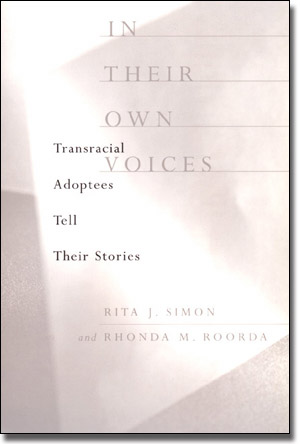Columbia University Press; 2000
Buy In Their Own Voices on Amazon.com >
Since the early 1960s, there has been a debate about transracial adoption, especially the adoption of black children into white homes. Those who oppose transracial adoption, led by the National Association of Black Social Workers, argue that black children reared by white parents grow up confused about their racial identity and alienated from the black community. In this collection of candid interviews, adoptees shed light on this complex and controversial issue by sharing their own experiences. Everyone involved in transracial adoptions, from parents to social workers, should read this book.
The authors of In Their Own Voices interviewed 24 black and biracial men and women, ages 22 to 28. Overall, the participants make a compelling case for transracial adoption. It’s clear that these adoptees believe their parents love and care for them; they all claim they benefited from being adopted by their families. Yet this overall positive assessment does not diminish the adoptees struggles with everything from hairstyles and dating to the deeper, lingering issues of identity and race.
“To say that being black in a white family is not complex would not be a true statement,” writes Rhonda Roorda, one of the book’s authors. “It has been difficult. I think I’ve gone through every emotion on the spectrum. I’ve been determined to answer the question, ‘Who am I?'”
The overriding message of In Their Own Voices is that transracial adoption can work, with one important caveat: Adoptive parents must recognize the importance of their child’s racial history and culture and make that history and culture part of their family life. Adoptee Donna White takes this a step further, saying that white families who live in isolated communities should not be allowed to adopt black children.
“If a black child is placed with a white family, the family needs to go through more than the typical steps in the adoption process,” said Francis, a woman who is interviewed in the book. Her parents worked hard to expose her to her ethnic heritage. White parents need to understand that they cannot treat a black child like a white child.
While all 24 adoptees believe their parents tried their best, some said their life might have been easier had their parents learned more about black history, mixed with black families, lived in diverse neighborhoods, and joined black churches.
Many of the books sentiments are relevant for white parents adopting any child of another race. Whether African American, Latino, Chinese, or Korean, all adoptees want and need a connection to their heritage.
Reviewed by Katy Robinson, author of A Single Square Picture: A Korean Adoptees Search for Her Roots.



